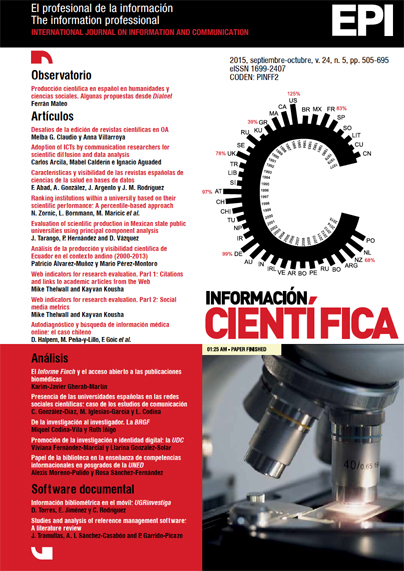Web indicators for research evaluation. Part 2: Social media metrics
DOI:
https://doi.org/10.3145/epi.2015.sep.09Keywords:
Altmetrics, Alternative metrics, Alternative indicators, Citation analysis, Web indicators, Webometrics, Scientometrics, Social media metrics, Twitter, Mendeley.Abstract
This literature review assesses indicators derived from social media sources, including both general and academic sites. Such indicators have been termed altmetrics, influmetrics, social media metrics, or a type of webometric, and have recently been commercialised by a number of companies and employed by some publishers and university administrators. The social media metrics analysed here derive mainly from Twitter, Facebook, Google+, F1000, Mendeley, ResearchGate, and Academia.edu. They have the apparent potential to deliver fast, free indicators of the wider societal impact of research, or of different types of academic impacts, complementing academic impact indicators from traditional citation indexes. Although it is unwise to employ them in formal evaluations with stakeholders, due to their susceptibility to gaming and lack of real evidence that they reflect wider research impacts, they are useful for formative evaluations and to investigate science itself. Mendeley reader counts are particularly promising.
Downloads
Downloads
Published
How to Cite
Issue
Section
License
Dissemination conditions of the articles once they are published
Authors can freely disseminate their articles on websites, social networks and repositories
However, the following conditions must be respected:
- Only the editorial version should be made public. Please do not publish preprints, postprints or proofs.
- Along with this copy, a specific mention of the publication in which the text has appeared must be included, also adding a clickable link to the URL: http://www.profesionaldelainformacion.com
- Only the final editorial version should be made public. Please do not publish preprints, postprints or proofs.
- Along with that copy, a specific mention of the publication in which the text has appeared must be included, also adding a clickable link to the URL: http://revista.profesionaldelainformacion.com
Profesional de la información journal offers the articles in open access with a Creative Commons BY license.




